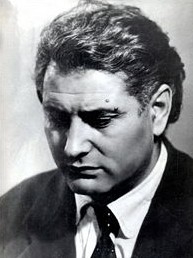Hovhannes Shiraz
Thursday, April 10, 2025
Shiraz was born Onik Tadevosi Karapetyan in the city of Alexandropol, then part of the Russian Empire (now Gyumri, Armenia). His mother, Astghik, was widowed by the Armenian Genocide shortly before his birth. Shiraz grew up in a considerable poverty. His first work called Beginning of Spring was published in 1935. Novelist Atrpet gave the talented poet the epithet "Shiraz", because "this youth's poems have the fragrance of roses, fresh and covered with dew, like the roses of Shiraz" (Shiraz being one of Iran's major cities, famous for its roses and poets). Another version of his pen name is "Shirak azn"—a child of Shirak, the region he was from.
In 1937 Hovhannes Shiraz entered the Armenian Literature Department of Yerevan's State University, where he studied until 1941. He also studied at the Moscow Maxim Gorky Literature Institute. In 1958, he published the first volume of his anthology Knar Hayastani (Lyre of Armenia). The second and third volumes were published in 1965 and 1974. These collections include the best examples of Shiraz's poetry.
Shiraz mostly wrote and published poetry. He is an author of very popular patriotic and love poems included "Ani", "My Mother", "May my love remain a secret", "Siamanto and Khjezare", "Expromptu", "Like the Pagan Love", "My Holy Homeland", "The Fate of Armenians", "To Andranik", etc. He wrote "The Armenian Dante-esque" about the Armenian genocide, a subject that was banned in Soviet Union. The first version of this masterpiece was written in 1941. Only short passages from this work were published in Soviet Armenia during his lifetime, and some chapters were published in Beirut and Tehran. The entire poem (over 8000 lines) was published in 1990 in Yerevan.
He was buried at Komitas Pantheon, in Yerevan, along with other distinguished Armenians.
He first married famous Armenian poet Silva Kaputikyan. His son with Kaputikyan, Ara Shiraz, was a sculptor. Shiraz had seven children with his second wife, Shushanik Shiraz (Aristakesyan, 1937–2006), one of whom was Sipan Shiraz, a poet.
Yerevan school #169 and a street in Julfa, Isfahan are named after him. The Hovhannes Shiraz House-Museum is located in a nineteenth-century building in Gyumri.
Shiraz was known for his good sense of humour. In 1963 John Steinbeck visited poet's apartment in Yerevan, and then wrote in a letter: "...men are closest together when they laugh together. And I remember that in Yerevan we laughed together a great deal."
Yevgeny Yevtushenko and Alexander Gitovich dedicated poems to Shiraz.
Shiraz was an anti-establishment poet who was very popular with the people of Soviet Armenia but fought against its corrupt Soviet leadership all his life. When in 1974 the known critic Suren Aghababyan brought to Shiraz the news about awarding of the Order of Lenin, his answer followed: "And what they [the Soviet government] want in exchange? To buy my silence?"





